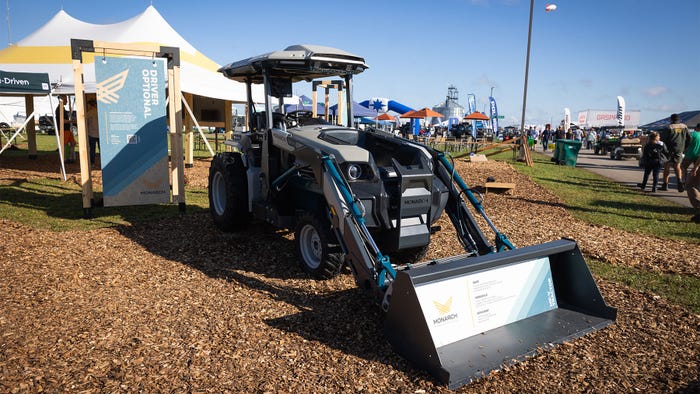September 21, 2023

Monarch Tractor made its Midwestern debut at the 2023 Farm Progress Show in Decatur, Ill. Monarch had two MK-V tractors on display, showcasing the machine’s fully electric, driver-optional offering.
Mark Schwager, Monarch Tractor co-founder and president, was on-site with several other members of the Monarch team to answer questions. Schwager has over 15 years of experience in the electric vehicle industry and says he’s excited to be on the forefront of electrification in ag.
“Ag is an industry that is hungry for technology,” says Schwager, explaining that he’s become passionate about addressing some of the challenges farmers face. “From Mother Nature to labor shortages to economic challenges to safety — the variability in the ag industry is certainly unique.”
The Monarch MK-V Tractor is the first of its kind. But what makes it different than other electric tractors on the market?
The battery. The MK-V is a 100% electric, battery-operated tractor with up to 14 hours of run time, varying based on farm, operation and implement. The battery is swappable and can be changed by a single person in six to 10 minutes with Monarch’s swapping cart. The battery charges in five to six hours with an 80-amp charger, already found in most barns or machine sheds.
The driver. The MK-V is driver-optional, meaning it can be driven like a traditional tractor or by itself, autonomously. The tractor architecture is “by-wire,” simplifying most tractor controls to the touch of a button on the MK-V smart screen.
The brains. The roof of the MK-V contains cameras that enable 360-degree situational awareness to help avoid collisions and navigate through rows or stop at obstacles. The tractor also has a feature known as “shadow mode,” which is the capability to follow the operator — for example, walking through a gate and having the tractor follow.
The price. The MK-V retail price is $88,998. The price is considerably higher than other 40-hp-equivalent tractors. However, Schwager says the labor, fuel and maintenance savings equate to a payback period as short as 13 months.
The maker. MK-V tractors are made in the U.S. They tout a farmer-first design, with more than four years of collaboration with farmers during early design and development. All tractors are designed in Livermore, Calif., and built in Lordstown, Ohio, in one of the nation’s largest automotive plants.
The MK-V has been available in the western U.S. since December 2022, and is popular with specialty crop and dairy farm customers. Monarch is scaling up production and adding dealers across the U.S., intending to expand to the Midwest in 2024.
“Automation utilization has gone up every week — we’ve been tracking it,” Schwager explains. “Farmers are really starting to adopt and understand how to fully harness the technology we have on these tractors.”
Schwager says customer reactions so far have been overwhelmingly positive, and other companies are taking notice. Monarch has licensed its technology to CNH Industrial, owner of Case IH and New Holland, for electric and digital offerings.
The MK-V has a 40-hp-equivalent, and Schwager says with today’s electrification capabilities, there are limits to how much horsepower equivalent can be achieved.
“With where electrification and technology are today, our technology can go up to about 150 hp,” Schwager says. “In probably five years, that number will grow to 200 hp, and in 10 years, likely somewhere between 250 and 300. Electrification for those larger vehicles will take a little bit more time.”
Electrical infrastructure has been a concern of folks across the county as electrification increases, but Schwager says he isn’t worried.
“Once the fleet gets to a certain size on a given piece of the electrical grid, then we have to think about how we might change infrastructure to arrive at a single location,” he says. “But that’s something the U.S. government needs to invest in and will invest in; policy progress is already headed that way.”
Farmers react to electric, autonomous tractor
Schwager says reactions at the Farm Progress Show were interesting — a combination of intrigue, excitement and skepticism.
“People here in the Midwest understand that this progress and change we’re seeing with electrification is inevitable,” Schwager says. “They want to be a part of it, and they think this tractor’s pretty cool — and they want to see it on their farms.”
The skeptic. John Klemm of Waynesville, Ill., raises corn, soybeans and beef cattle. Klemm works alongside his father, and the two have one employee who predominately helps on the grain side of the farm. Klemm describes himself as an old soul who is cognizant of new technologies and recognizes their place in the industry. He says the 40-hp-equivalent MK-V likely wouldn’t benefit his family’s grain farm, is concerned about the tractor’s cost, and has questions about the potential impact electrification could have on ethanol demand.
The excited. Dwayne Martin of Wakarusa, Ind., raises corn, soybeans and dairy cattle, and owns a machinery dealership. Martin has a Monarch MK-V Tractor ordered for 2024 delivery that he plans to use to mow pastures and push feed on his dairy farm. He’s most excited about the autonomous capability and hopes the MK-V will help with labor gaps around the farm. Martin’s greatest concern is serviceability and dealer support as Monarch expands into the Midwest.
The intrigued. Kyle Corrigan of Athens, Ill., raises corn, soybeans, cattle and hay. Corrigan works alongside his father-in-law and has a hired employee who also works on the farm. Corrigan says with limited labor, he can see the benefit of the MK-V’s autonomy and shadow mode to aid in doing cattle chores, mowing pastures and building fences. His biggest concerns are price, size and whether the smaller tractor would benefit the row crop side of the farm. However, Corrigan admits that if the MK-V ran around the clock pulling a smaller planter, it would be worth comparing to their current setup.
Read more about:
AutonomousAbout the Author(s)
You May Also Like






